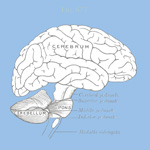The least pain in our little finger gives us more concern and uneasiness, than the destruction of millions of our fellow-beings. – William Hazlitt
As early as 1796, when he was just eighteen, the English essayist William Hazlitt may have become the first Westerner to see that self-concern is not rationally required.
Hazlitt published his insight in 1805, in his Essays on the Principles of Human Action. Introducing the 1990 edition, John Price informs us that “The reading public and the reviewing journals regarded it, for the most part, with indifference or hostility.” Hazlitt’s Essays and the idea they contain fell into obscurity for the best part of two centuries, after which the idea re-emerged independently as part of a new wave of thought about personal identity Continue reading “Hazlitt’s Insight”








 Imagine, in the early days of books, a small library consisting entirely of original manuscripts. Some of them are very old, and have been attacked by mice. Some have deteriorated so much that their pages crumble to dust when the custodian of the library tries to read them. He mourns the loss of these books, and contemplates the inevitable decay of the remaining books with sorrow. To be sure, new manuscripts are occasionally added to the library, but they cannot replace the volumes that are lost forever. This goes on until, one day, the young assistant librarian has an idea. “This book will be unreadable in five years,” he tells his elder. “But I can read it now. If I copy the words of this book onto sheets of new vellum, and bind them in a strong new binding, we will be able to read it for many decades to come.” The old librarian tenderly strokes the cracked spine of the crumbling volume, and shakes his head. “What good is a copy? It wouldn’t be the same book.”
Imagine, in the early days of books, a small library consisting entirely of original manuscripts. Some of them are very old, and have been attacked by mice. Some have deteriorated so much that their pages crumble to dust when the custodian of the library tries to read them. He mourns the loss of these books, and contemplates the inevitable decay of the remaining books with sorrow. To be sure, new manuscripts are occasionally added to the library, but they cannot replace the volumes that are lost forever. This goes on until, one day, the young assistant librarian has an idea. “This book will be unreadable in five years,” he tells his elder. “But I can read it now. If I copy the words of this book onto sheets of new vellum, and bind them in a strong new binding, we will be able to read it for many decades to come.” The old librarian tenderly strokes the cracked spine of the crumbling volume, and shakes his head. “What good is a copy? It wouldn’t be the same book.”  Part Three of
Part Three of  Roger Beethey shows up late, with a blonde. Elliot gives him a pleading look. “Relax,” says Beethey.
Roger Beethey shows up late, with a blonde. Elliot gives him a pleading look. “Relax,” says Beethey.